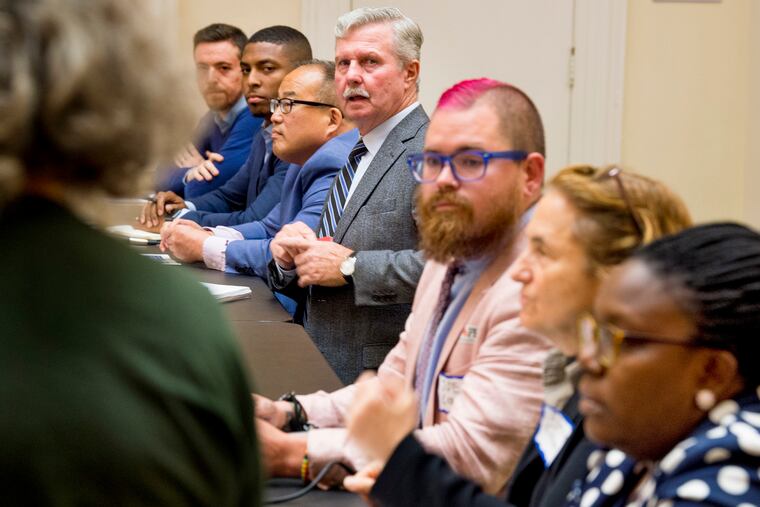Philadelphia City Council could see a seismic shift in the 2019 election. Here’s what you need to know.
Almost all important elections in Philadelphia are effectively settled in the Democratic primary, given the city’s overwhelmingly Democratic tilt. But on Tuesday, there are two competitive City Council races on the ballot that could have a big impact on Philly policy and policy for years to come.

Almost all important elections in Philadelphia are effectively settled in the Democratic primary, given the party’s overwhelming voter-registration advantage. But in Tuesday’s general election, there are two competitive City Council races on the ballot that could have a big impact on Philly policy and politics for years to come.
In the race for City Council’s seven at-large seats, a pair of candidates from the Working Families Party are mounting the strongest third-party campaign in memory, threatening to capture seats that are guaranteed to independents or minority-party candidates under the city’s Home Rule Charter and that have been held by Republicans for 70 years. And in the 10th Councilmanic District in Northeast Philly, a 40-year Republican incumbent is facing a serious challenge from the Democratic nominee, a political newcomer.
Taken together, the election has the potential to usher a new class of liberal lawmakers into City Hall and further marginalize Republicans, pushing local government policy leftward on issues like taxation and affordable housing.
Council is already poised to gain at least three new members next year. Randall Miller, a political historian at St. Joseph’s University, said that the election of additional newcomers could challenge the “old ways of discipline” in the chamber.
“There could be — I don’t want to say chaos — but there could be needs for big adjustments on Council after this election,” Miller said in a recent interview.
Here’s what you need to know.
City Council at-large seats
There are seven at-large seats on the 17-member Council, and they are elected in citywide elections, rather than by geographic districts. The Home Rule Charter allows each party to nominate five at-large candidates and each voter to choose five.
The arrangement effectively guarantees that two Council members come from outside the dominant party. Since the 1950s, Democrats have held five at-large seats, and Republicans have filled the two others.
But this year, two candidates from the progressive Working Families Party — community organizer Kendra Brooks and pastor Nicolas O’Rourke — have waged a campaign to take those two seats. They have both raised more money than any previous third-party Council candidate in Philadelphia history. They’re also benefiting from substantial campaign spending by the national Working Families Party.
“We’ve already won because we have changed the narrative of us radical lefties," Brooks said at a recent campaign rally. "We’ve already broken records. We already have not backed down from the powers that be that said this was impossible and this campaign was a joke. And here we are.”
» READ MORE: City Council At-Large: A unique opportunity for political diversity | Endorsement
Tenants’ rights attorney Sherrie Cohen, who has previously run for Council as a Democrat, is also carrying her own banner, the A Better Council Party, in trying to win one of the set-aside seats.
Meanwhile, infighting among Republicans has led to uncertainty about whether the two at-large GOP incumbents, David Oh and Al Taubenberger, will finish in the top two among their own party’s voters.
Dan Tinney, a steamfitter running with the support of labor unions, could break into the top of the Republican field. The other Republicans in the race are conservative business owner Bill Heeney and reform-minded attorney Matt Wolfe.
The 10th Councilmanic District
Brian O’Neill, who won his first Council race in 1979, is the only Republican who holds a district Council seat, and he’s also the only Council member representing a district that both parties could feasibly win.
Registered Democrats outnumber Republicans by more than 2-1 in the district, which includes the Northeast Philly areas of Bustleton and Pennypack. But O’Neill has held on to his seat for decades with a moderate brand of politics, high name recognition in the area, and support from the police union, which is politically powerful in the Northeast.
“Bipartisan is the only thing I know," O’Neill recently told The Inquirer. "I leave partisan politics when I leave my house in the morning.”
Judy Moore, an executive with the Garces Group restaurant company who is married to a police officer, appeared poised to give O’Neill a run for his money when she won the backing of Philadelphia 3.0, an outside political group that helped defeat longtime West Philadelphia Councilwoman Jannie Blackwell in this year’s Democratic primary.
» READ MORE: City Council 10th District: Northeast Philly should pass the torch to Judy Moore | Endorsement
The group, however, appears to have abandoned the 10th District race. Northeast residents haven’t received mailers or seen ads from the group, O’Neill and other Northeast residents and politicos have said, and it has reported spending little money in the weeks leading up to the election. The group has not responded to requests for comment.
Moore could still win, given Democrats’ substantial registration advantage in the district, not to mention the prospect of opposition to President Donald Trump driving voter turnout even in an off-year election. She’s branding herself as a political moderate, too, arguing that the Northeast needs a new perspective after four decades of O’Neill.
“I started to see that all of our generational families that have grown up here in the Northeast that have lived in the neighborhoods, all of my friends and family, were moving for better schools and different opportunities,” she said. “Being an elected official is a service ... and shouldn’t really be a career.”